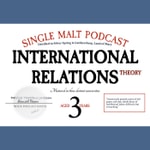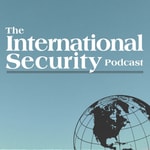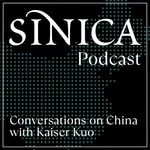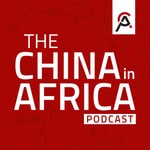Whiskey & International Relations Theory – Détails, épisodes et analyse
Détails du podcast
Informations techniques et générales issues du flux RSS du podcast.

Whiskey & International Relations Theory
Drs. Patrick Thaddeus Jackson & Daniel Nexon
Fréquence : 1 épisode/42j. Total Éps: 33

Patrick and Dan work their way through a piece of international-relations scholarship. And drink whiskey.
Classements récents
Dernières positions dans les classements Apple Podcasts et Spotify.
Apple Podcasts
🇨🇦 Canada - socialSciences
02/08/2025#91🇬🇧 Grande Bretagne - socialSciences
02/08/2025#69🇨🇦 Canada - socialSciences
01/08/2025#73🇬🇧 Grande Bretagne - socialSciences
01/08/2025#34🇨🇦 Canada - socialSciences
31/07/2025#62🇬🇧 Grande Bretagne - socialSciences
31/07/2025#23🇨🇦 Canada - socialSciences
30/07/2025#54🇨🇦 Canada - socialSciences
29/07/2025#43🇬🇧 Grande Bretagne - socialSciences
29/07/2025#93🇬🇧 Grande Bretagne - socialSciences
28/07/2025#72
Spotify
Aucun classement récent disponible
Liens partagés entre épisodes et podcasts
Liens présents dans les descriptions d'épisodes et autres podcasts les utilisant également.
See allQualité et score du flux RSS
Évaluation technique de la qualité et de la structure du flux RSS.
See allScore global : 53%
Historique des publications
Répartition mensuelle des publications d'épisodes au fil des années.
Episode 33: Status? You Just Met Us!
Épisode 33
dimanche 15 octobre 2023 • Durée 01:15:07
[audio updated to fix a mixing error]
The second installment of our live taping at the British International Studies Association annual convention in Glasgow is a "Whisky Optional" roundtable on status and international-relations theory. Our guests are: Ali Bilgic of Loughborough University, Michelle Murray of Bard College, Rohan Mukherjee of the London School of Economics, and Steven Ward of the University of Cambridge.
The taping was sponsored by the Clydeside Distillery.
Related readings: Ali Bilgic, Turkey, Power and the West: Gendered International Relations and Foreign Policy; Michelle Murray, The Struggle for Recognition in International Relations: Status, Revisionism, and Rising Powers; Rohan Mukherjee, Ascending Order: Rising Powers and the Politics of Status in International Institutions; and Steven Ward, Status and the Challenge of Rising Powers.
Some articles mentioned include (implicitly or explicitly) include: Ward, "Lost in Translation: Social Identity Theory and the Study of Status in World Politics," Larson and Shevchenko, "Status seekers: Chinese and Russian responses to US primacy," and Musgrave and Nexon, "Defending Hierarchy from the Moon to the Indian Ocean: Symbolic Capital and Political Dominance in Early Modern China and the Cold War."
An important edited collection on status and international politics is Status and World Politics, eds. Paul, Larson, and Wohlforth.
The classic "chickens" article is Ivan D. Chase, "Social Process and Hierarchy Formation in Small Groups: A Comparative Perspective."
Episode 32: Social Forces, States, and Clydeside Whisky
Épisode 32
vendredi 18 août 2023 • Durée 01:16:48
Robert Cox's landmark article, "Social Forces, States and World Orders: Beyond International Relations Theory," appeared in the journal Millennium in 1981. Among other things, it introduced the distinction between "critical" and "problem-solving" theory to international-relations scholars.
But this isn't just any old episode where Patrick and Dan ramble their way through some decades-old academic article. No, it's the first-ever live recording of Whisky and IR Theory, which took place in Glasgow in June at the annual convention of the British International Studies Association. And we had a sponsor: the Clydeside Distillery, which generously provided everyone with drinks... and souvenir whisky glasses.
A good time was had by most. If you missed out, we'll be holding another live taping in London in October. More to come.
Episode 23: Being Academic and Pandemic Time
Épisode 23
mardi 19 avril 2022 • Durée 01:33:58
In this “Whiskey Optional” episode, PTJ facilitates a conversation among four colleagues from different countries and different kinds of academic institutions about the current global pandemic – not primarily about research on the pandemic, but about the experience of being an academic during the pandemic. Since part of that experience involves bringing our theoretical predilections to bear on the contemporary situation, we drift back and forth between the pandemic as a scholarly object and the pandemic as an experiential actuality.
Episode 22: So a Deputy Foreign Minister and an Academic Realist Walk into a Bar
Épisode 22
mardi 8 mars 2022 • Durée 02:04:40
In 2014, John Mearsheimer authored a Foreign Affairs article in which he blamed that year's Ukraine crisis on the U.S., NATO, and the EU. The next year he gave a talk on the subject which the University of Chicago uploaded to YouTube.
Last week the Russian Ministry of Foreign Affairs used excerpts from Mearsheimer's article and talk as part of its efforts to propagandize in favor of Russia's full-scale invasion of Ukraine. Isaac Chotiner subsequently interviewed Mearsheimer for the New Yorker.
For some reason, Patrick and Dan thought it would be a good thing to record an impromptu podcast on the controversy – and to down more whisky than usual during the process. We've managed to cut the discussion down to two hours, but it's not, shall we say, the most organized episode we've done.
Topics include specific aspects of Mearsheimer's argument, the importance of skepticism about what government officials tell you, and how academics should present their arguments when engaging in public-facing scholarship. Caveat emptor.
Note that this is a corrected version of the original podcast. Dan inaccurately characterized two aspects of the talk. He's added a mea culpa at the start of the episode and edited the discussion accordingly.
Episode 21: Constructivists All the Way Down
Épisode 21
mercredi 26 janvier 2022 • Durée 01:39:19
Is Constructivism best understood as a scholarly disposition, a body of theory, or an intellectual movement? Is it still relevant, or has it exceeded its shelf life? What if there are lots of Constructivists but they use different labels for their work?
In our third "Whiskey Optional" episode, Dan Nexon sits down with Michelle Jurkovich (University of Massachusetts, Boston) . David McCourt (University of California, Davis), Swati Srivastava (Purdue University), and Brent Steele (University of Utah) to get their thoughts about the state of Constructivism and Constructivist theory.
Episode 20: International Order
Épisode 20
jeudi 7 octobre 2021 • Durée 01:40:02
In this installment of "Whiskey Optional," Stacie Goddard (Wellesley), Evelyn Goh (Australian National University), and Kyle Lascurettes (Lewis and Clark) join the podcast. You'll never guess what the subject of discussion is.
Unless you read the title of this episode.
Then you'll know that it's about "International order."
The panelists tackle such pressing questions as: What is international order, anyway? Is it everything... or nothing at all? Why do academic debates about international order give a lot of scholars a sense of déjà vu? How can a concept that's taken on such a central place in policy debates remain so elusive?
Episode 19: "W" Stands for "Canonical Realist"
Épisode 19
samedi 31 juillet 2021 • Durée 00:47
PTJ and Dan pick up where they left off – on Chapter 5 of Arnold Wolfers' Discord and Collaboration. There's a lot going on, including a discussion of revisionism, the question of whether "friendship" is possible in world politics, and the distinction between "power" and "influence." They cover classic essays on, for example, the balance of power and "'National Security' as an Ambiguous Symbol." They ask if Wolfers offers an alternative vision of the study of realpolitik... and if that vision is still relevant more than fifty years later.
Episode 18: Name Your Discord Server "and Collaboration"
Épisode 18
samedi 17 juillet 2021 • Durée 01:36:41
Arnold Wolfers is one of the most important figures of "mainstream" mid-20th century international-relations theory, but is now mostly cited for his definition of "revisionism" and for perhaps his most famous essay, "'National Security' as an Ambiguous Symbol." Discord and Collaboration (1962) collects previously published essays and intersperses them with new ones that are aimed at making the collection more cohesive. It covers a variety of issues that remain subjects of debate in the field, such as state-centrism. Patrick and Dan discuss its arguments, the events that drive some of its analysis, and how it slots into later debates in IR theory, such as the "False Promise" dispute covered in the prior two episodes.
This is our first episode to come out since affiliating with the academic international-relations website, the Duck of Minerva. If you have questions or reactions to this episode, you might consider leaving a comment on this episode's associated blogpost.
Episode 17: The Institutionalists Strike Back
Épisode 17
mardi 22 juin 2021 • Durée 01:41:46
Less than a year after the appearance of "The False Promise of International Institutions," the journal International Security published replies from Robert Keohane and Lisa Martin, John Ruggie, Clifford and Charles Kupchan, and Alexander Wendt. Patrick and Dan discuss this important moment in the "paradigm wars" of the 1990s and 2000s.
Episode 16: Promises, Promises
Épisode 16
vendredi 26 mars 2021 • Durée 02:15:54
This episode runs over two hours, so you can always skip to: biographical material and the whisky selection (13:40); framing of the article (26:55); the article begins (33:50); realism according to Mearsheimer (53:00); the article's criticisms of liberal institutionalism (1:24:30), "collective security" (1:41:30), and "critical theory" (1:45:40); or some concluding remarks (~2:03:30).









